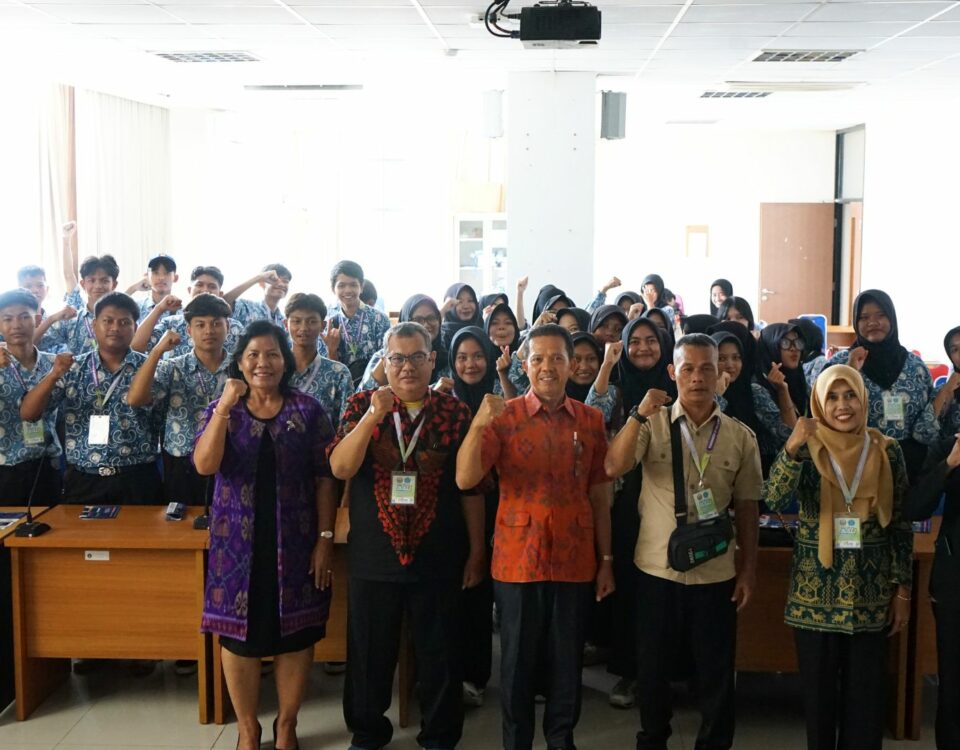Singaraja- The stages of the 2019-2023 Rector Election (Pilrek) for the Ganesha University of Education (Undiksha) continue to roll out. Wednesday (16/1/2019) four prospective candidates, namely Dr. I Gusti Lanang Agung Parwata, S.Pd., Dr. I Gusti Ngurah Pujawan, M.Kes., Dr. I Gede Sudirtha, S.Pd.M.Pd and Dr. I Nyoman Jampel, M.Pd., conveyed the vision and mission in front of the academic community and representatives of the Ministry of Research, Technology and Higher Education.
Guided by the Chair of the Undiksha Senate, Prof. Dr. I Nyoman Sudiana, M.Pd, the prospective candidate in Nyoman Jampel got the first turn. To win the number one seat at the largest state university in North Bali, he, who has incumbent status, carries the vision of realizing a superior Ganesha University of Education based on Tri Hita Karana through internationalization and a trend center university. Meanwhile, its mission is to strengthen and improve university institutional governance based on the values of Tri Hita Karana and Good University Governance, improve the quality of implementation of the Tri Dharma of Higher Education through internationalization, and trend center universities based on Tri Hita Karana values, improve the quality of facilities and infrastructure provided. meet national higher education standards and international standards, as well as improve the competency and welfare of human resources towards international standards and become a national and international trend center.
This academic from South Kuta, Badung has prepared a series of programs. 2019 -2020 is the year of the reputable international university. To make this happen, strategic steps have been taken. Some of these include developing a KKNI-based curriculum with international recognition and increasing the quality and quantity of international research, international publications, and international conferences. Apart from that, there is also the development of internationally standardized infrastructure. Meanwhile, 2021-2023 will be the year of Trend Center University. In this case, several things have been done, namely making Undiksha a reference and role model for national learning, and developing research that has become a national and international reference. There are still a number of strategies on offer.
Not much different from I Gusti Lanang Agung Parwata. He also excels in his vision. Namely, realizing a superior university in teaching based on the Tri Hita Karana philosophy in ASEAN by 2023. Its mission is to carry out institutional governance in an integrated, transparent, accountable, fair, and responsible manner. Organizing education and teaching with dignity and character. Carrying out competitive, collaborative, and innovative research and community service.
The programs offered, for the institutional sector, include developing the Diligent, Active, Diligent, Tenacious (RATU) mentality of the entire academic community, encouraging collective participation of the entire academic community to achieve their main tasks, functions, and best performance. In the education sector, generating a curriculum based on SNPT and KKNI which is based on the Tri Hita Karana philosophy to build human resources with character, developing character education to produce graduates with character, upholding truth, honesty, and obedience, improving quality educational infrastructure to support learning activities
Specifically for the research and PKM fields, a roadmap was created so that it is useful in developing universities, developing research centers, and PKM based on science and human resources. Meanwhile, in the personnel sector, improving quality and professionalism, providing excellent service for all academics and student affairs, improving student development both extracurricular and extracurricular, and optimizing the role of companions in every student activity.
I Gede Sudirtha carry the vision of realizing governance with a culture of quality, excellence, and innovation towards a world-class university. Its mission is to realize effective, efficient, and productive institutional governance. Realizing effective, efficient, and productive human resource management. There is also realizing effective, efficient, and productive financial governance and sources of financial income, realizing effective, efficient, and productive management of facilities and infrastructure, realizing effective, efficient, and productive Tri Dharma Higher Education governance.
The Dean of the Technical and Vocational Faculty offers 18 programs. Some of these include increasing the innovation, IT, and English-based capabilities of lecturers towards quality services and internationalization of Undiksha, making budgeting system regulations and budget distribution that are accountable, effective, efficient, and productive and have a sense of togetherness towards the vision of superior Undiksha and making regulations and strengthening the implementation of collaborative research domestically and abroad.
The final candidate, I Gusti Ngurah Pujawan carries the vision of realizing a superior Ganesha Education University based on Tri Hita Karana through innovation, collaboration, and internationalization. Its mission is to strengthen and improve university institutional governance based on the principles of Tri Hita Karana and good university governance, improving the quality of implementation of the Tri Dharma of Higher Education through innovation, internationalization, and downstream of results based on the principles of Tri Hita Karana. Apart from that, there is also the fulfillment of standardized quality of institutional facilities and infrastructure, increasing the competency and welfare of human resources, as well as empowering other institutional resources based on the principles of collaboration and cooperation. There are eleven programs offered by this academic from Sibang, Badung Regency. Some of these include increasing Undiksha’s relevance and academic excellence through developing a competency-based curriculum that is oriented to the needs of the world of work. There is also an increase in the number and quality of input (prospective students) and coaching student activities, improving the quality of the learning process to international standards. According to him, it is also no less important to increase the accreditation of study programs. (hms)





